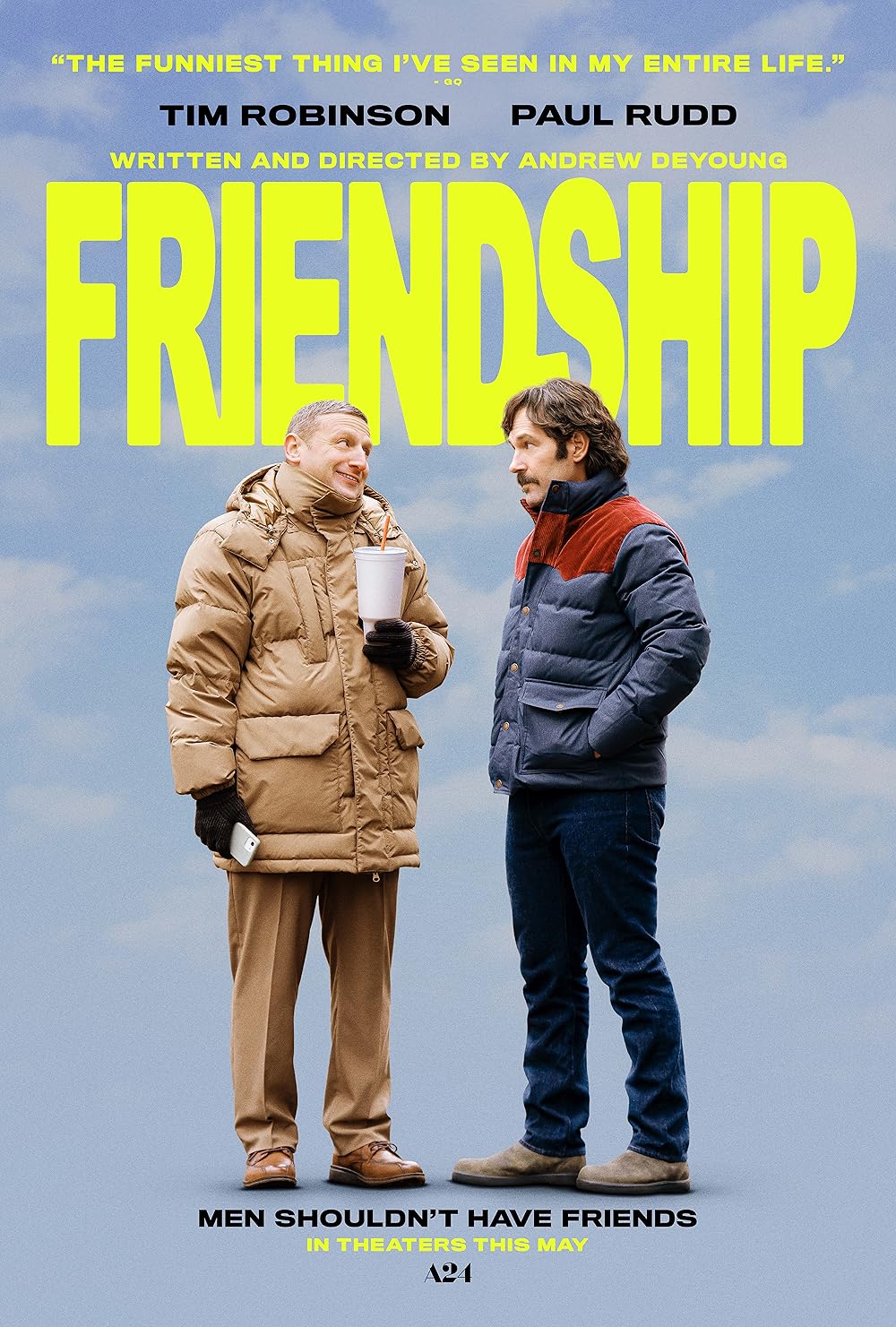“Friendship” is the “Fatal Attraction” of male bonding comedies, and follows a similar arc. It’s about a nebbish named Craig Waterman (Tim Robinson) whose life is on a downward slope. He works at a public relations firm and has a wife named Tami (Kate Mara) who runs a florist business out of their suburban home. Tami had cancer a year ago, but it’s in remission. They have a teenage son, Steven (Jack Dylan Grazer), who openly adores his mom but is polite but chilly to his dad. The marriage is falling apart. The film makes this clear in its first scene, which is set in a group therapy meeting for couples dealing with cancer. Craig makes everything about himself.
The couple’s new neighbor, local weatherman Austin Carmichael (Paul Rudd), is a narcissist, too, but not as extreme. He does a better job of presenting himself as a regular guy and a bit of a “man’s man,” unlike the awkward, goofy, abrasive Craig. Austin is conventionally good-looking, funny, and charming, and has cool stuff and cooler hobbies (like collecting ancient artifacts and going mushroom-hunting in the forest). You figure out that Austin is winging things as he moves through life and is a bit of a smooth-talking faker (though more of an inconvenience to others than a danger).
None of that is a crime, of course. Nor is Austin’s misreading a brand new friend as being more stable than he is, and coming on so strong with brotherly warmth and one-on-one bonding time that it starts to look like the bro version of “love bombing.” Austin hangs out so much with Craig in such a short span that pumping the brakes even a bit is sure to wound him, and once that happens, an already unsettling movie gets increasingly dark. Austin invites Craig to join him and his core group of male friends for a hangout, and Craig, er, well—it’s best if you experience this disaster for yourself.
You’ll feel bad for Craig up to a point. Still, you’ll also understand that he’s crossed a lot of lines, that Austin is right to set firm boundaries afterward, that Austin’s pals inflamed an already bad situation by belittling Craig for his errors, and that Craig takes every slight as a mortal wound. In his feature film debut, writer-director Andrew DeYoung and his collaborators take their sweet time building to Craig’s inevitable detonation, immersing us in his miserable existence and using subjective filmmaking to put us inside his mind. Early in the film, there’s a string of tightly edited fantasies of Craig becoming an important and even mythical figure in Austin’s life that keeps topping itself in ridiculousness, like a cutaway gag on early seasons of “The Simpsons.” Soon you realize that this man wants so badly to feel valued, respected, and essential that when someone gives him that kind of attention and then suddenly takes it away, he can’t accept it, much less recover and move on.
Robinson, of course, comes into this film via his sketch comedy series “I Think You Should Leave.” It’s hard to imagine better preparation. The series is so extreme in its off-kilter satirical look at human relations that it split audiences into drastically opposed camps: those who think it’s daring and innovative and brilliant and can’t get enough of it, and those who could barely tolerate five minutes of it, and go on chat boards and social media to ask how anyone could possibly enjoy it. Robinson is recognizably self-abasing and off-putting here. But there are fresh notes which confirm that, like Steve Carell and Bill Hader, although he’s mostly a comic actor who excels at semi-improvised clowning, he can bring the rage when the part requires it.
De Young’s brand of comedy is adjacent to Robinson’s. It also owes a lot to British- and American-made series like “The Office” (both versions), “The Thick of It,” “Veep” and “Succession,” which put so many profoundly maladjusted and/or barely coherent egomaniacs into the same story that when a calm, informed, considerate person appeared onscreen, they seemed lost and horrified. Where “Friendship” differs—and to my mind, excels—is in the aesthetic. Where a lot of films would have been content to set up promising situations and let the characters crash into each other like billiard balls, “Friendship” is a visually, sonically, and musically immersive work, far more than a sitcom in feature form. It puts real thought into how convey Craig’s warped point-of-view and make us feel his insecurity, self-loathing, and anger.
The filmmaking is more imaginative and subtle than the screenplay. The writing gets repetitive when Craig unmoors himself from common sense and wanders impulsively from situation to situation, making a spectacle of himself and becoming increasingly chaotic. The only fully fleshed-out character is Craig, though we get enough glimpses of Austin apart from Craig that we have a sense of his totality. (Rudd, whose participation as costar and executive producer helped get “Friendship” funded, is excellent here, deftly peeling back the character’s layers.) Everyone else is in the movie to stir the pot. Craig’s wife and son don’t have much definition, nor does Austin’s wife, who has so little screen time that I nearly forgot they were married. Steven is characterized mainly by how he dotes on his mother and is disappointed in/disgusted by his father. Tami is defined by her deer-in-the-headlights calmness. Sometimes she sounds like a hostage who’s being careful not to set off her captor.
It’s possible to defend all this as a representation of how Craig sees every person in his orbit as forces that soothe or damage his ego, rather than complete persons. But the filmmaking choices don’t entirely support that reading. It seems more likely that both the acting and directing are highly intuitive, more so than in most narrative features, and that the artists made a decision to follow dream logic rather than real-world logic, but left the setting just recognizable enough that you might ask questions like, “If this movie is set in the present and cell phones figure heavily in the plot, why is everyone calling each other on old fashioned land lines with spirally cords?” and “Is the lapse in judgement that puts Tami in harm’s way believable as something she would really agree to do, or does it happen because the plot needs it to happen?”
Despite the lapses in judgment, DeYoung, a frequent director of such tonally varied TV comedies as “PEN15,” “Shrill,” “High Maintenance,” and “Our Flag Means Death,” has a strong voice that’s not like anyone else’s. I’m not convinced that “Friendship” is the corrosive comic masterpiece that early festival raves primed us for. But it’s impressive, not just for the leaps it makes but the assurance it displays.




















